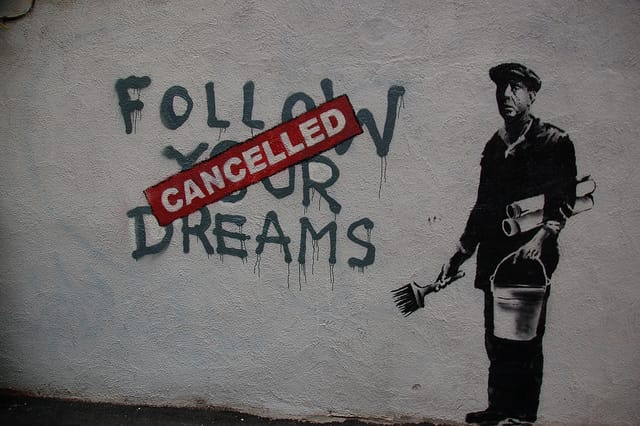in·er·tia (ĭ-nûr′shə) n. 1. Physics: The tendency of a body to resist acceleration; the tendency of a body at rest to remain at rest or of a body in straight line motion to stay in motion in a straight line unless acted on by an outside force. 2. Resistance or disinclination to motion, action, or change: the inertia of an entrenched bureaucracy.
This week, after fifteen and a half years working for the same organisation, I handed in my resignation. It’s something I’ve thought about for a while, a step I knew I needed to take, but never quite managed to follow through.
There was always something keeping me there. Long service leave, an emotional crisis, a health crisis, my study, personal relationships, wanting to reach the next project milestone. I’ll just wait until… and then I’ll leave.
From the moment I arrived, I never intended to stay. Just out of university, I fell into my job. It was a stopgap, an income to pay the rent and the bills until I went back to study. Except I never did. Not in the way I planned, anyway.
For a long time I wasn’t proud of the work that I did: basic administration, with a bit of personal assistant thrown in. It used one set of skills, but never really challenged me in the way I wanted. When I asked my manager why we did things a certain way, or offered suggestions for improvement, she said, “You’re paid to work, not to think.” Still I pressed on, pursuing a “career” under the mentorship of my next manager. Eventually I found a position as an adviser, where I felt I could help people and actually make a difference… to a point.
I began to see a pattern: during the first work cycle in a new role, I would flounder, feeling silly for not knowing more. By the second, I’d feel proficient, and see ways to improve what we did, to work more efficiently, and more effectively. I’d question our reasons for doing things. What were we trying to achieve? Was there a better way? By the third work cycle, I would butt my head against the wall as people took the same courses of action and made the same mistakes, over and over.
My strategy was to exit each role before reaching that point of frustration, but it didn’t always work. My parents divorced around the time I was looking to move on from one department, and it took an emotional toll. I realised I needed stability and familiarity in at least one aspect of my life while I churned through the childhood murk that surfaced from the end of that toxic relationship. Twice more emotional upsets (my own divorce and treatment for a cancerous breast lump) delayed my decision to move on. Later I was finishing my Masters degree, and it didn’t make sense to leave when my workplace allowed me to work and study. It was one justification after another for not taking the action I wanted and needed.
By then I was in a role where I was being paid to think, not just to work. My frustration then came from the inertia that permeated every part of a change-resistant organisation. Despite implementing program after program of supposed improvement, despite seeking advice from consultants, restructuring, relabelling, devolving, centralising, then devolving once more, despite hiring and firing, and all the resources poured into attempts at change, the organisation remained the same. “A leopard that can’t change its spots shouldn’t pay people to say it looks better in stripes,” I wrote on my Facebook wall after facing one too many examples.
And I wasn’t unhappy the entire time. Between bouts of frustration, I felt supported, built some wonderful friendships, learned how to put my analytical brain to practical purpose as I became (I was told) an excellent business analyst. For several years, I thought I had found my dream job, working with people just like me, carrying hope that the quality of our work and dedication would be realised in the quality of our outcomes.
I soon learned the analyst can hope and dream and plan, but those plans don’t always come to fruition. If your designs manage to pass through each hurdle and are finally implemented (which is rare), people don’t necessarily adopt them. Instead they chip away at the new processes until things run exactly as before. I saw my visions diluted and eroded until they resembled what I had worked so hard to change.
My frustration escalated to unhealthy despair. I had no hope left. Another project milestone pushed out, abandoned. Meanwhile the organisation was trying once again to implement a program of change. But Program Y was just the new name for Program X, and Program W before that. At best it would create a period of disturbance, but even when things shift one way, after a couple of years they shift back again — an endless tide wearing different patterns on the surface, but once the water departs, it is still the same sand underneath.
I wish I didn’t care so much. I wish I hadn’t reached this point. It’s only a job, after all, but I feel the tide has taken me and battered me against the rocks. For so long I have felt trapped, wanting to leave, but not feeling capable. Almost like an addiction, I knew staying was bad for me, that I needed to change, but I clung on just the same. At least it was stable, familiar: safe.
I wasn’t just clinging to security, I was running away from what it would mean once those shackles were gone, what freedom might look like. When there are no boundaries, you have to make a choice. What if I made the wrong one?
I wonder if this same mechanism, this need for familiarity, for stability, operates across the organisation, each individual clinging on, resisting lasting change, creating inertia too great for any external force to act on. I have struggled against it, but I can’t force change on others. I can only change myself. My long-term goals might be fifteen years away, but if I don’t work towards them now, I will still be fifteen years older, without ever having tried. And if I make the wrong choice, I will choose again. Freedom to fall is also the freedom to fly.
So I choose to stop fighting, stop clinging to false hope, to false security, to stop making excuses and stop being afraid. Because the inertia isn’t only around me, it has lived inside me.
It is time to release the shackles, to grieve for the years of myself I have poured into trying to make things work, trying to make a difference. There is no lasting difference to make. It is time to learn from my experiences and start anew. I choose to reach for happiness, for meaning; to act, finally, and walk away.





